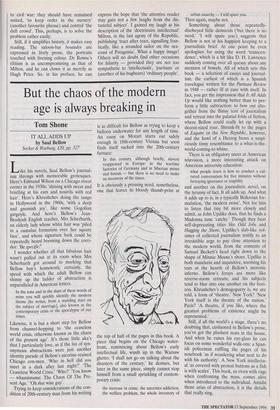But the chaos of the modern age is always breaking
in
Tom Shone
IT ALL ADDS UP by Saul Bellow Seeker & Warburg, £20, pp. 327 Like his novels, Saul Bellow's journal- ism throngs with memorable grotesques. Here's Edmund Wilson on a Chicago street corner in the 1930s: 'shining with sweat and bristling at his ears and nostrils with red hair'. Here's Khrushchev doing the tango in Hollywood in the 1960s, 'with a deep and gnomish joy', like some Gogolian gargoyle. And here's Bellow's Jean- Brodyish English teacher, Mrs Scherbarth, an elderly lady whose white hair was 'piled in a cumulus formation over her square face', and whose signature bark could be repeatedly heard booming down the corri- dor: 'Be specific!'
I wonder whether all that fabulous hair wasn't pulled out at its roots when Mrs Scherbarth got around to marking that Bellow boy's homework; certainly, the speed with which the adult Bellow can shinny up the ladder of abstraction is unparalleled in American letters.
In the tone and in the slant of these words of mine you will quickly identify the modern theme [he writes, from a standing start on the subject of marriage], also known as the contemporary crisis or the apocalypse of our times.
Likewise, it is but a short step for Bellow from channel-hopping to 'the ceaseless world crisis, otherwise known as the chaos of the present age'. It's those little aka's that I particularly love, as if the list of syn- onymous abstractions were just another identity parade of Bellow's nicotine-stained Chicago con-men. 'Who in hell did you meet in a dark alley last night?' The Ceaseless World Crisis.' Who?"You know — whassisname: The Chaos Of The Pre- sent Age.' Oh that wise guy'.
Trying to keep considerations of the con- dition of 20th-century man from his writing is as difficult for Bellow as trying to keep a balloon underwater for any length of time. An essay on Mozart starts out safely enough in 18th-century Vienna but soon finds itself sucked into the 20th-century furnace:
In this century, although briefly, slavery reappeared in Europe: in the wartime factories of Germany and in Siberian mines and forests — but there is no need to make an inventory of the times.
It is obviously a pressing need, nonetheless, one that leaves its bloody thumb-print at
the top of half of the pages in this book. A piece that begins on the Chicago water- front, reminiscing about Bellow's early intellectual life, winds up in the Warsaw ghetto: 'I shall not go on talking about the disasters of the century,' he demurs, but later in the same piece, simply cannot stop himself from a small sprinkling of contem- porary crisis:
the increase in crime, the narcotics addiction, the welfare problem, the whole inventory of urban anarchy — I will spare you.
Then again, maybe not.
Something about those repeatedly- disobeyed little demurals (tut there is no need,' I will spare you') suggests that Bellow is not at his happiest keeping to a journalistic brief. At one point he even apologises for using the word 'transcen- dence', which is a bit like D. H. Lawrence suddenly coming over all queasy about any mention of bowels. All of which sets this book — a selection of essays and journal- ism, the earliest of which is a Spanish travelogue written for the Partisan Review in 1948 — rather ill at ease with itself. In fact, you get the impression that It All Adds Up would like nothing better than to per- form a little subtraction: to bow out alto- gether from the flimsy tent of journalism and retreat into the palatial folds of fiction, where Bellow could really let rip with a decent-sized roar. Shrunk-fit to the pages of Esquire or the New Republic, however, and the howl of a Herzog bears a suspi- ciously tinny resemblance to a what-is-the- world-coming-to whine.
There is an obligatory sneer at American television, a more interesting attack on American university education:
what people learn is how to conduct a cul- tured conversation for five minutes without betraying ignorance or stupidity
and another on the journalistic novel, on the tyranny of fact. It all adds up. And what it adds up to is, in a typically Bellovian for- mulation, 'the modern noise'. Not for him to listen that tiny bit more closely and admit, as John Updike does, that he finds a Madonna tune 'catchy.' Though they bear self-deprecating titles like Odd Jobs and Hugging the Shore, Updike's slab-like vol- umes of collected journalism testify to an irresistible urge to pay close attention to the modern world, from the contents of Samuel Beckett's head right down to the shape of Minnie Mouse's shoes. Updike is both mandarin and inquisitive, warming his toes at the hearth of Bellow's moronic inferno. Bellow's forays are more like reverse-zoom retreats; and his subjects tend to blur into one another on the hori- zon. Khrushchev's demagoguery is, we are told, a form of 'theatre.' New York? 'New York itself is the theatre of the nation.' Paris? 'A theatre, if you like, where the greatest problems of existence might be represented.'
Still, if all the world's a stage, there's no doubting that, cushioned in Bellow's prose, you've got the plushest seats in the house. And when he raises his eye-glass he can focus on some wonderful walk-ons: a Span- ish policeman ruffling the pages of his notebook 'as if wondering what next to do with his authority'. A New York intellectu- al 'as covered with protest buttons as a fish is with scales'. This book, so riven with rage when confronting the mass, comes alive when introduced to the individual. Amidst those arias of abstraction, it is the details that really sing.


























































 Previous page
Previous page